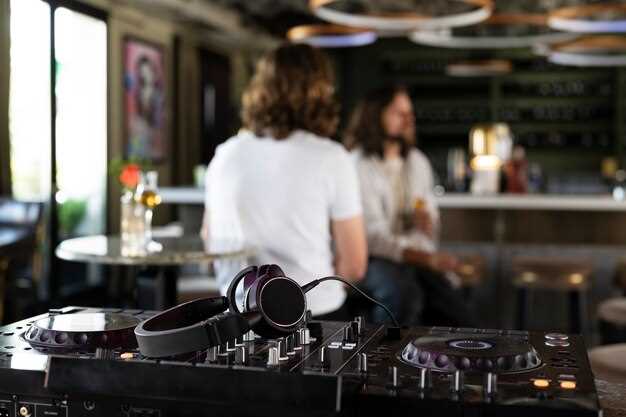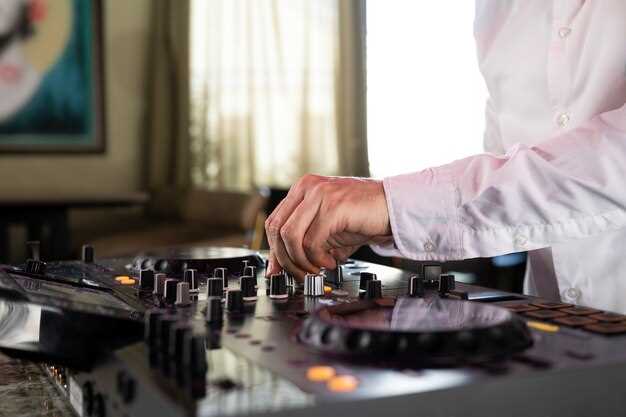First, invest in quality equipment that can cater to diverse wedding needs. Your setup should include a professional-grade mixer, reliable speakers, and a microphone with a solid range. Investing in a durable set of turntables or a DJ controller can provide greater flexibility in mixing tracks. Research your options carefully and look at reviews from other DJs to ensure your equipment won’t let you down at crucial moments.
Next, build a distinctive music library that suits a wide range of tastes. Weddings often bring together people from multiple generations and backgrounds, so having an extensive and varied playlist is vital. Curate a collection with everything from classic hits to current chart-toppers, ensuring you have options for every stage of the celebration–from emotional first dances to high-energy finales. Maintaining up-to-date knowledge of popular music trends can also keep your playlists fresh and engaging.
Refine your skills by practicing mixing and transitions rigorously. Smooth transitions between songs are key to maintaining the vibe of an event, so practice until they become second nature. Consider taking online courses or attending workshops to learn new techniques and styles. Building a unique style will not only set you apart from others but can also become your signature as a wedding DJ.
Develop strong people skills and a professional work ethic to build trust with clients. Meet with couples ahead of their wedding to understand their specific expectations and preferences. Good communication is essential; it keeps everyone on the same page, leading to fewer surprises on the big day. Reliable and prompt communication can help in establishing a positive reputation, leading to word-of-mouth referrals and repeat business.
Building Your DJ Skill Set

Focus on mastering music mixing techniques. Learn how to seamlessly blend songs by paying attention to beats and tempos. Consider practicing with different genres to expand your versatility, as weddings often feature diverse musical tastes.
Invest time in music theory. Understanding the fundamentals, such as rhythm, melody, and harmony, can enhance your ability to create enjoyable playlists. This knowledge helps in making informed choices when matching songs to create a smooth flow that keeps guests engaged.
Engage with lighting and sound equipment. Familiarize yourself with the technical aspects, such as setting up speakers and mixers. High-quality sound and visually appealing lighting can elevate the atmosphere significantly.
Consider tailoring your skills with crowd reading. Observing and interpreting the guests’ reactions can guide your music choices, ensuring everyone enjoys the celebration. Adapting quickly to crowd dynamics is key to maintaining the energy on the dance floor.
Refine your personal brand. Create a compelling DJ persona that resonates with your audience. This involves not just your music style but also your presence and interaction during events. Developing a distinct brand can set you apart and attract more clients.
Understanding Wedding DJ Responsibilities
Communicate effectively with the couple to understand their musical preferences and specific requests. Establish a playlist that resonates with their vision for the reception, ensuring a seamless flow of music throughout the event.
Coordinate with the wedding planner and venue staff to align timelines and technical requirements. Ensure that all equipment is set up and tested well before the event begins to avoid any disruptions.
Act as an MC (Master of Ceremonies) to announce key moments, such as the first dance, cake cutting, and speeches. Maintain a positive and engaging atmosphere, encouraging guests to participate and enjoy the celebration.
Adapt to the crowd’s energy levels, transitioning between different genres and tempos to keep the dance floor lively. Be prepared to alter the playlist as needed to match the evolving mood of the event.
Manage volume levels and sound quality, taking into account the acoustics of the venue and the comfort of guests. Balance the music so that it’s enjoyable without overwhelming conversations.
Handle unexpected scenarios such as technical difficulties or sudden weather changes during outdoor events. Always have backup equipment and contingency plans ready to ensure the music doesn’t stop.
Finalize the evening by thanking the couple and guests, ensuring a memorable end to the event. Leave a lasting impression by exceeding expectations and creating an unforgettable soundtrack for their special day.
Gaining Experience Through Small Events and Parties
Begin by offering your services at intimate gatherings, such as private parties or community events. These settings provide a perfect opportunity to hone your skills without the stress of a large audience. Reach out to friends, family members, or local organizations and propose your DJ services to add a spark to their events.
As you perform at these initial events, focus on understanding crowd dynamics and adapting your setlist to sustain energy levels. Use every chance to improve your timing, transitions, and technical setup. Capture feedback from attendees and organizers to identify areas for growth and to refine your technique.
To systematically track your progress, consider keeping a journal or spreadsheet that records details of each event, such as the type of music played, audience reactions, and any equipment issues. Analysing this data can reveal patterns in your performance and aid in continuous improvement.
| Event Type | Key Takeaways |
|---|---|
| Birthday Party | Practice blending upbeat tracks; learn to manage varying age demographics. |
| Corporate Event | Emphasize a clean set with seamless transitions; keep volume balanced for networking. |
| Community Fair | Engage with diverse music tastes; adapt quickly to changing crowd sizes. |
Networking is another vital element. Small events often have a personal atmosphere that fosters connections. Engage with attendees, distribute business cards, and be open about your ambitions as a DJ. Establishing relationships at this stage may lead to referrals for future wedding gigs.
Selecting the Right Equipment for Wedding Settings
Begin by prioritizing a reliable sound system, as it plays a crucial role in any wedding. Opt for speaker brands such as QSC or JBL, known for their clarity and power. For venues with over 150 guests, consider speakers with at least 1000 watts. Investing in a quality mixer like the Pioneer DJ DJM series ensures seamless transitions between songs.
Lighting sets the mood, so explore options like LED uplights which can enhance the venue’s ambiance. Brands like CHAUVET are ideal for providing customizable colors to match the wedding theme. A wireless DMX controller adds flexibility by allowing you to adjust lighting remotely.
Test the microphone beforehand to avoid feedback during speeches. Shure’s SM58 is a trusted choice for its durability and clear sound quality. For wireless options, Sennheiser offers reliable sets that won’t drop signal in large spaces.
A backup laptop loaded with duplicates of your music library is essential to prevent any technical mishaps. Serato DJ and Rekordbox are popular software choices that offer music library management and seamless integration with DJ controllers.
| Equipment | Brand Recommendations | Key Features |
|---|---|---|
| Speakers | QSC, JBL | Clarity, Power over 1000 watts |
| Mixer | Pioneer DJ DJM Series | Seamless song transitions |
| Lighting | CHAUVET | Customizable LED colors |
| Microphone | Shure SM58, Sennheiser | Durability, Clear wireless options |
| Backup Laptop | N/A | Loaded with music library duplicates |
| DJ Software | Serato DJ, Rekordbox | Music management, Integration |
By focusing on these key pieces of equipment, you’ll be better prepared to create a memorable experience for the wedding couple and their guests.
Curating a Diverse Music Library for Various Audiences
Build an extensive catalog by incorporating music from multiple genres. Include classic hits, modern chart-toppers, and lesser-known gems from different eras and cultures. Prioritize balance by featuring tracks that resonate across age groups and cultural backgrounds, ensuring everyone finds something they enjoy.
Create playlists tailored to different moments of the wedding day, such as ceremony, cocktail hour, dinner, and reception. Each playlist should offer a range of tempos and moods to match the setting and keep guests engaged. For example, include softer instrumentals or acoustic tracks for the ceremony and upbeat, fast-paced tunes for the reception.
Stay up-to-date with industry trends and new releases by subscribing to music platforms and newsletters. Regularly update your library to reflect contemporary tastes while also considering the timeless appeal of older tracks. Explore online communities and forums where DJs share insights and recommendations to further refine your selections.
Engage with clients early in the planning process to understand their musical preferences and any specific tracks or genres they want included. Gauge their comfort level with different musical styles and make suggestions based on their vision for the event. Personalizing your selections not only meets their expectations but can also introduce them to new favorites they hadn’t considered.
Keep a pulse on the vibe during the event by observing guests as they interact with your music choices. Be ready to adjust on-the-fly, mixing in songs based on energy levels and guest feedback. A flexible and dynamic approach allows you to create an unforgettable experience for everyone present.
Tuning into the Latest Music Trends and Classic Hits
Stay updated with music trends by regularly exploring streaming platforms like Spotify and Apple Music. Create playlists of trending songs and observe which tracks gain traction. Pay attention to wedding-specific playlists that strike a balance between contemporary hits and timeless classics.
Analyze charts such as Billboard’s Hot 100 to monitor rising tracks and determine what resonates with audiences. Attending music festivals and local gigs can provide insight into emerging genres and artist performances that captivate listeners.
Incorporate classic hits by keeping a diverse library of evergreen tracks from the 70s, 80s, and 90s, ensuring each song has stood the test of time in party settings. Regularly engaging with wedding clients and gathering song requests allows you to tailor your setlist, blending current sensations with nostalgic favorites, ensuring everyone has a moment of delight on the dance floor.
Utilize DJ pools and music forums to discover curated selections that match your audience’s preferences. This approach aids in creating a memorable atmosphere, combining well-loved anthems with the fresh sounds of today’s chart-toppers. Regularly updating your library with high-quality mixes and mashups ensures smooth transitions, keeping the energy high throughout the event.
Navigating the Wedding Industry as a DJ

Build strong relationships with wedding planners and venues by attending local bridal shows and industry networking events. These connections lead to valuable referrals and insights into client preferences. Working closely with planners ensures you understand the schedule and flow of the day, which helps provide a seamless experience for the couple and their guests.
- Portfolio Development: Create a professional online portfolio showcasing your wedding DJ experience. Include testimonials, sample playlists, and photos from past events to give potential clients a sense of your style and versatility.
- Understanding Client Preferences: Conduct thorough consultations with couples to understand their musical tastes and specific requests. This personal touch highlights your dedication to creating a unique experience for them.
- Staying Updated: Keep your music library current and familiarize yourself with trending songs and genres popular in weddings. This ensures you’re prepared to meet diverse musical requests.
- Quality Equipment: Invest in durable, high-quality sound and lighting equipment. Reliable gear minimizes technical issues and ensures you deliver the best audio-visual experience.
- Contractual Clarity: Clearly outline all terms, including fees, overtime charges, cancellation policies, and specific services offered to avoid misunderstandings. Providing detailed contracts demonstrates professionalism and protects both parties.
- Adaptability: Be prepared to adapt to on-the-fly changes, whether it’s a last-minute song request or adjusting to a delayed schedule. Flexibility enhances your reputation as a reliable DJ.
Engage with couples through social media and online platforms by sharing wedding tips, behind-the-scenes content, and personalized playlists. This helps build trust and keeps your service top-of-mind for upcoming nuptials. Regularly seek feedback from clients post-event to refine your service. Positive reviews not only validate your efforts but also attract new clients. By continuously enhancing your skills and understanding the wedding industry’s nuances, you solidify your place as a go-to wedding DJ.
Creating a Professional DJ Brand and Image
Build a strong visual identity to establish your professional DJ brand. Develop a memorable logo that reflects your style and music genre. Invest in high-quality promotional materials, such as business cards and flyers, that incorporate this logo. Maintain a consistent color scheme and typography across all these materials to ensure brand recognition.
Enhance your online presence by creating a professional website. The website should feature an easy-to-navigate gallery of your past events, testimonials from satisfied clients, and a demo mix that showcases your skill. Optimize each page with relevant keywords to improve search engine visibility, and ensure your contact information is readily accessible.
Your social media profiles play a pivotal role in building your brand. Regularly update platforms like Instagram, Facebook, and SoundCloud with photos, videos, and music clips from weddings and other events. Engage with your audience by responding to comments and messages promptly, and ask clients for permission to tag them in posts to reach a broader audience.
- Networking: Attend wedding industry events and join professional DJ associations to connect with others in the field. Create partnerships with wedding planners and venues for referrals.
- Attire: Always dress appropriately for weddings, considering the style of the event. Your appearance should reflect professionalism and align with your brand image.
- Reputation: Deliver exceptional service at every event. Positive reviews and word-of-mouth recommendations are crucial for building trust and credibility with potential clients.
- Continual Improvement: Stay updated with the latest music trends and DJ technology. Regularly refine your skills through workshops and online courses to ensure you offer fresh and innovative entertainment.
Networking with Wedding Planners and Venues
Connect directly with wedding planners and venue coordinators by attending local bridal shows and industry events. This helps build personal relationships and demonstrates your enthusiasm for collaborating on memorable weddings.
- Offer to provide music or sound for their events at a discounted rate or even gratis to showcase your skills.
- Create a professional digital portfolio, highlighting previous events, to visually appeal to planners and venue managers.
- Engage with them on social media platforms by sharing and commenting on their content, which helps keep you top-of-mind.
- Develop a unique selling proposition that distinguishes your DJ services and clearly communicate this in your conversations and materials.
- Join local networking groups or forums focused on wedding professionals to expand your connections and gain valuable insights.
Partner with venues to offer exclusive packages, which they can present to soon-to-be-married couples. This provides an additional selling point for both managing teams and can streamline efforts in booking events.
- Reach out proactively and regularly to maintain these professional connections, perhaps by sending occasional updates or news about your services.
- Always send a thank-you note or follow-up email after meetings or collaborative events to reinforce your relationship with planners and venues.
Through these strategies, positioning yourself as a reliable and resourceful DJ for weddings becomes more achievable, increasing opportunities within the industry.
Setting Up a Pricing Strategy for Your DJ Services
Research local competitors to understand the going rates for wedding DJ services in your area. Analyze their pricing structures, packages, and included features to identify gaps you can exploit. Offer unique value, such as personalized playlists or live mixing sessions, to stand out.
Consider the time and resources required for each event, including travel, setup, and breakdown. Calculate your costs and ensure your pricing covers these expenses while providing a reasonable profit margin. Transparent communication with clients about what your package includes helps avoid misunderstandings later.
Create package tiers that cater to different budgets and needs. Basic packages might include simple sound and light set-ups, whereas premium packages could offer extras like additional speakers, advanced lighting, or photo booths. Diversifying packages ensures you can appeal to a broader audience.
Offer discounts for off-peak seasons or last-minute bookings to fill your calendar more consistently. Encouraging early bookings with limited-time offers or special deals can secure your schedule and cash flow. Such strategies ensure you remain competitive while increasing your bookings.
Regularly reassess your pricing based on feedback and financial goals. Adjustments may be necessary as your experience and reputation grow. By staying adaptable, you can refine your approach and maintain a profitable, client-friendly service.
Video:

7 Game Changing Wedding DJ Tips | Wedding DJ Tutorial
7 Game Changing Wedding DJ Tips | Wedding DJ Tutorial
Q&A:

What key equipment do I need to start as a wedding DJ?
To begin your journey as a wedding DJ, you will need reliable DJ equipment that suits both your budget and the size of events you plan to cover. Essential items include a quality controller or turntables, a laptop with DJ software, a versatile mixer, and a robust sound system. Equally important are microphones for speeches and announcements, and lighting equipment to enhance the atmosphere. Investing in good-quality headphones is also crucial for cueing and monitoring music accurately.
How do I build a playlist that appeals to different age groups at a wedding?
Building a playlist that accommodates guests of all ages involves selecting a diverse range of songs that have broad appeal. It’s effective to include a mix of genres such as classic hits from past decades, popular contemporary tracks, and traditional songs that are commonly associated with weddings. You can also communicate with the couple beforehand to incorporate any specific requests or culturally significant songs. Pay attention to the flow of the event and be ready to read the room, adjusting the music in real-time to keep guests engaged and entertained.
How can I market myself effectively as a wedding DJ to gain more clients?
Effective marketing as a wedding DJ can be achieved through multiple channels. Start by creating a professional website showcasing your services, previous work, and client testimonials. Highlighting your unique selling points, such as versatility in music genres and reliability, can attract potential clients. Utilizing social media platforms to post short clips of your DJ sets and engage with followers is also beneficial. Establish partnerships with wedding planners and venues to gain referrals, and consider offering special promotions or packages for first-time clients to encourage word-of-mouth recommendations.
Are there specific timelines or guidelines I should follow during a wedding event?
Yes, having a structured timeline is important for ensuring the smooth flow of the event. Typically, a wedding DJ’s schedule should align with the key moments of the wedding day, such as the arrival of guests, the couple’s first dance, dinner service, and open dance floor periods. Communicate closely with the couple and the event coordinator to be aware of any special announcements or transitions that require specific music cues. Staying adaptable and prepared to adjust the schedule as needed can help in maintaining a successful event.
What common challenges might I face as a wedding DJ, and how can I prepare for them?
One common challenge is dealing with technical issues, such as equipment malfunction. To mitigate this, regular maintenance of your equipment and having backup components is advisable. Another challenge might be managing diverse music requests from guests. Preparing a wide-ranging music library and being familiar with crowd-pleasers across genres can help you accommodate requests without compromising the event’s flow. Additionally, unpredictable factors such as sudden changes in schedule or unexpected external conditions can occur, so having a flexible mindset and strong communication skills will serve you well.
What equipment is necessary to start DJing at weddings?
To begin DJing at weddings, you’ll need a reliable laptop with DJ software, a quality DJ controller, and a pair of dependable headphones. Additionally, investing in professional-grade speakers and a microphone for announcements is crucial. Optional equipment could include lighting setups to enhance the venue’s atmosphere. It’s a good idea to have backup devices in case of technical issues. This setup will help ensure you deliver an enjoyable experience for the wedding party and their guests.
How can I build a playlist that caters to everyone at a wedding?
Building a diverse playlist that pleases a wide audience involves mixing different genres and familiar hits across various decades. Start by consulting with the couple on their preferences, including songs they love or wish to avoid. Consider including crowd-pleasers, classic hits, and current chart-toppers. Always gauge the audience’s reactions and be ready to adapt the playlist on the spot to maintain energy and engagement. This approach ensures that all age groups and musical tastes are represented, making the event enjoyable for everyone present.
